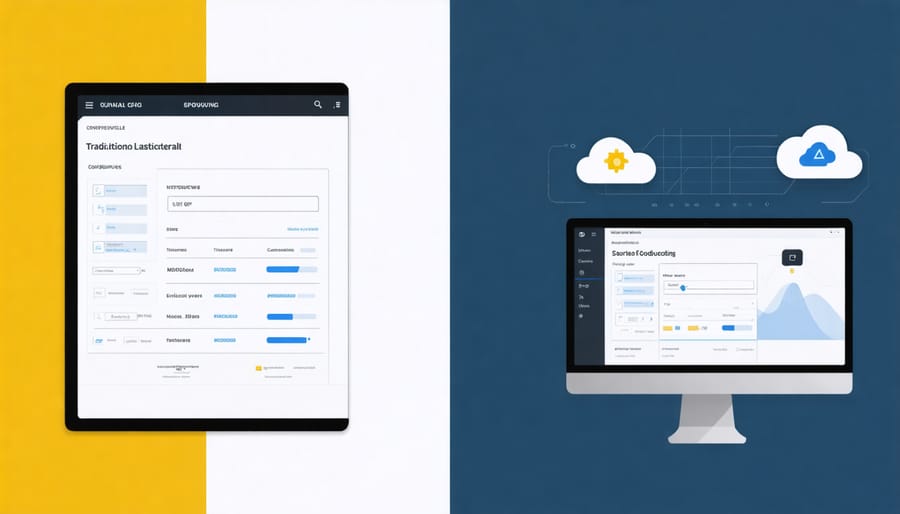In today’s rapidly evolving construction landscape, innovative finance solutions are revolutionizing how projects move from blueprint to reality. Digital payment platforms, integrated project management systems, and blockchain-based smart contracts now enable real-time financial tracking and automated milestone payments, dramatically reducing payment delays and improving cash flow management.
The construction sector’s traditional financing models are being transformed by emerging technologies and alternative funding mechanisms. From crowdfunding platforms specifically designed for development projects to supply chain financing solutions that optimize working capital, these new tools are creating unprecedented opportunities for stakeholders across the industry.
Project owners and contractors leveraging these innovative financial solutions report up to 30% faster payment processing times and a 25% reduction in administrative costs. These improvements directly impact project timelines, resource allocation, and overall project success rates. The integration of artificial intelligence and machine learning further enhances risk assessment capabilities, enabling more accurate project forecasting and smarter financial decision-making.
As the industry continues to embrace digital transformation, understanding and implementing these innovative finance solutions becomes crucial for maintaining competitive advantage and ensuring project success in an increasingly complex market environment.
Digital Financing Platforms Transform Project Funding
Blockchain-Based Construction Financing
Blockchain technology is revolutionizing construction financing by introducing unprecedented levels of transparency and efficiency in project funding and payment processes. Through smart contracts and distributed ledger technology, stakeholders can track financial transactions in real-time, reducing payment delays and disputes that traditionally plague the industry.
The implementation of blockchain-based financing enables automated milestone payments, where funds are released automatically when predetermined project benchmarks are met and verified. This system significantly reduces administrative overhead and eliminates the need for multiple intermediaries in payment processing.
According to recent industry studies, construction projects utilizing blockchain-based financing report a 60% reduction in payment processing time and a 45% decrease in payment-related disputes. The technology’s immutable nature ensures that all financial transactions are permanently recorded and easily auditable, providing enhanced security and trust among project participants.
Leading construction firms are already leveraging blockchain platforms to streamline supply chain financing, enabling suppliers and subcontractors to access funding based on verified work completion. This approach improves cash flow management and reduces the financial burden on smaller project participants.
As the technology matures, blockchain-based construction financing is expected to become increasingly mainstream, offering solutions to long-standing industry challenges while fostering greater collaboration and financial transparency among stakeholders.

AI-Powered Risk Assessment Systems
Artificial Intelligence has revolutionized risk assessment in construction financing by analyzing vast datasets to deliver more accurate and comprehensive project evaluations. Modern AI systems can process thousands of variables simultaneously, from historical project performance metrics to real-time market conditions, providing lenders with unprecedented insight into project viability.
These intelligent systems evaluate traditional factors like credit scores and financial statements alongside advanced metrics such as contractor performance history, regional economic indicators, and environmental impact assessments. Machine learning algorithms can identify patterns and potential risks that might escape human analysis, leading to more informed lending decisions and optimized interest rates.
According to industry experts, AI-powered risk assessment has reduced evaluation times by up to 60% while increasing accuracy by 40%. The technology excels at detecting early warning signs of project delays or cost overruns by analyzing construction schedules, resource allocation, and supply chain dynamics.
For contractors and developers, these systems offer greater transparency in the lending process and often result in more favorable terms for well-planned projects. The technology also enables continuous monitoring throughout the project lifecycle, allowing for proactive risk management and early intervention when potential issues arise. This dynamic approach to risk assessment has become particularly valuable in complex, large-scale construction projects where traditional evaluation methods may fall short.
Alternative Financing Models Gaining Traction

Project-Specific Crowdfunding
Project-specific crowdfunding has emerged as a transformative financing mechanism in the construction industry, offering developers and contractors an alternative to traditional funding sources. This innovative approach leverages digital platforms to connect construction projects directly with multiple investors, ranging from individual contributors to institutional backers.
Leading platforms now specifically cater to construction projects, incorporating features such as milestone-based funding releases, progress tracking, and detailed technical documentation capabilities. These specialized platforms typically implement rigorous vetting processes, ensuring projects meet specific criteria regarding feasibility, permits, and risk assessment before listing.
Recent success stories include mixed-use developments, sustainable building projects, and community infrastructure initiatives that have successfully raised capital through crowdfunding. For example, the Mountain View Eco-Complex secured $4.2 million through crowdfunding, with investors receiving proportional equity stakes in the development.
Construction crowdfunding platforms often incorporate blockchain technology for transparent transaction tracking and smart contracts for automated milestone payments. This integration provides investors with real-time project updates and enhances accountability throughout the construction process.
However, project managers should carefully consider regulatory compliance, particularly regarding securities laws and investor accreditation requirements. Successful crowdfunding campaigns typically require comprehensive project documentation, clear risk disclosure, and professional marketing materials to attract potential investors.
Industry experts recommend starting with smaller, well-defined projects to build credibility before attempting to fund larger developments through crowdfunding platforms.
Equipment Financing Innovation
The construction industry is witnessing a transformation in equipment financing, with innovative solutions emerging to address the significant capital requirements of machinery acquisition. Traditional lending models are being supplemented by flexible financing options that better align with project timelines and cash flow patterns.
Usage-based financing has gained significant traction, allowing contractors to pay based on actual equipment utilization rather than fixed monthly payments. This model incorporates IoT sensors and telematics to track machine hours, enabling more accurate cost allocation and reduced financial burden during low-utilization periods.
Equipment-as-a-Service (EaaS) models are revolutionizing how construction companies access machinery. Instead of substantial upfront investments, businesses can now subscribe to equipment packages that include maintenance, repairs, and upgrades. This approach improves fleet management efficiency while preserving working capital for other critical operations.
Blockchain-enabled smart contracts are streamlining equipment financing transactions, reducing paperwork and accelerating approval processes. These digital agreements automatically execute predetermined terms, ensuring transparency and reducing administrative overhead.
Alternative financing platforms now offer peer-to-peer lending options specifically for construction equipment, connecting equipment owners with contractors needing machinery. This marketplace approach often results in more competitive rates and flexible terms compared to traditional financing methods.
For emerging technologies and specialized equipment, manufacturers are introducing hybrid financing solutions that combine traditional loans with performance guarantees and technology upgrade options, ensuring companies can maintain competitive advantages without compromising financial stability.

Supply Chain Finance Solutions
Dynamic Invoice Financing
Dynamic invoice financing is revolutionizing how construction companies manage their cash flow by providing real-time access to working capital based on outstanding invoices. This innovative solution enables contractors and suppliers to receive immediate payment for submitted invoices while clients maintain their standard payment terms.
Using advanced fintech platforms, construction businesses can now upload invoices digitally and receive funding within 24-48 hours, dramatically reducing the traditional 30-90 day payment cycles. The system employs automated risk assessment algorithms that evaluate invoice authenticity, project progress, and client creditworthiness to determine funding eligibility.
According to industry data, companies utilizing dynamic invoice financing report a 40% improvement in cash flow management and a 25% reduction in payment-related project delays. This solution particularly benefits subcontractors and material suppliers who often face significant gaps between project expenses and payment collection.
Key advantages include flexible funding limits that grow with your business, no fixed long-term commitments, and integration with popular construction management software. The transparent fee structure typically ranges from 1-3% of the invoice value, making it a cost-effective alternative to traditional financing options.
Materials Procurement Financing
Materials procurement financing has evolved significantly, introducing innovative solutions that help construction companies manage large-scale material purchases more effectively. Supply chain finance platforms now enable contractors to secure bulk materials while maintaining healthy cash flow through extended payment terms and early supplier payment options.
Recent developments include dynamic discounting programs, where contractors can access preferential pricing by leveraging their strong credit positions and payment histories. Digital platforms facilitate direct connections between material suppliers and financial institutions, streamlining the procurement process and reducing transaction costs.
Many construction firms are now utilizing material-specific credit lines that operate separately from traditional project financing. These specialized facilities allow companies to take advantage of bulk pricing opportunities without impacting their primary credit facilities. Additionally, blockchain-based procurement systems are emerging, offering transparent tracking of materials and automated payment releases based on delivery verification.
Integration with inventory management systems further enhances these financing solutions, allowing real-time monitoring of material usage and automated reordering based on project timelines. This technological advancement helps optimize working capital while ensuring consistent material availability for ongoing projects.
Risk Mitigation Through Financial Innovation
Project Performance Insurance
Project performance insurance represents a significant advancement in construction risk management, offering innovative coverage solutions that go beyond traditional insurance models. These specialized products protect stakeholders against performance shortfalls, construction defects, and energy efficiency guarantees, providing financial security throughout the project lifecycle.
One notable innovation is Integrated Project Delivery (IPD) insurance, which covers multiple parties under a single policy, fostering collaboration and shared risk management. This approach typically includes coverage for design errors, construction defects, and project delays, while incentivizing team performance through shared savings mechanisms.
Energy performance insurance has emerged as a crucial product, particularly for green building projects. This coverage guarantees that completed buildings will achieve specified energy efficiency targets, providing financial compensation if performance falls short of contractual requirements.
Another breakthrough is parametric insurance, which offers predetermined payouts based on specific triggering events, such as weather-related delays or material price fluctuations. This streamlines the claims process and provides quicker access to funds when needed.
Smart contract-enabled insurance policies are gaining traction, utilizing blockchain technology to automate claims processing and payment distributions. These policies can integrate with project management software and IoT devices to provide real-time risk monitoring and automated coverage adjustments.
Smart Contracts in Construction Finance
Smart contracts are revolutionizing payment and contract management in construction finance by automating crucial processes and ensuring transparent, tamper-proof transactions. These self-executing contracts, built on blockchain technology, automatically trigger payments when predetermined project milestones are achieved and verified.
For example, when a building’s foundation is completed and inspected, the smart contract can automatically release the associated payment to contractors. This automation significantly reduces payment delays, which traditionally plague the construction industry, and minimizes the risk of payment disputes.
The implementation of smart contracts also streamlines the documentation process. All contract terms, change orders, and payment schedules are encoded and stored on the blockchain, creating an immutable record that all stakeholders can access. This transparency helps prevent misunderstandings and reduces the likelihood of litigation.
Leading construction firms report up to 75% reduction in payment processing time and a 50% decrease in contract-related disputes after implementing smart contracts. The technology also enables real-time project financial tracking and automated compliance verification, ensuring that all parties meet their contractual obligations.
However, successful implementation requires careful planning, stakeholder buy-in, and integration with existing project management systems. Construction companies should start with pilot projects to test and refine their smart contract protocols before full-scale deployment.
Implementation Strategies
Successfully implementing innovative finance solutions requires a methodical approach and careful consideration of organizational readiness. Begin by conducting a thorough assessment of your current financial structure and identifying specific areas where innovative solutions could add value. This evaluation should align with your company’s long-term strategic objectives and financial risk management strategies.
Create a cross-functional implementation team that includes representatives from finance, operations, and technology departments. This team should develop a detailed roadmap that outlines key milestones, resource requirements, and potential challenges. Consider starting with pilot programs for specific projects or divisions before rolling out solutions company-wide.
Integration with existing systems is crucial. Ensure your chosen financial solutions can seamlessly connect with your current accounting software, project management tools, and enterprise resource planning systems. This may require investing in additional technological infrastructure or updating existing systems.
Training is essential for successful adoption. Develop comprehensive training programs for staff at all levels, focusing on both technical aspects and the strategic benefits of new financial tools. Regular feedback sessions can help identify and address implementation challenges early.
Monitor implementation progress through clearly defined key performance indicators (KPIs). These might include metrics such as reduction in financing costs, improvement in cash flow efficiency, or increased project funding success rates. Regular review and adjustment of these KPIs ensure the solutions deliver expected benefits and remain aligned with organizational goals.
Consider partnering with financial technology providers or consultants who specialize in construction finance innovation. Their expertise can help navigate complex implementation challenges and accelerate adoption across your organization.
The construction industry stands at a pivotal moment where innovative finance solutions are reshaping project delivery and business operations. These emerging financial technologies and alternative funding models have demonstrated their ability to enhance project efficiency, reduce risks, and create new opportunities for growth. The adoption of digital payment platforms, blockchain technology, and integrated financial management systems has streamlined processes and improved transparency across the construction value chain.
Looking ahead, we can expect further evolution in construction financing, driven by continued technological advancement and changing market demands. The integration of artificial intelligence and machine learning will likely lead to more sophisticated risk assessment models and automated financial decision-making processes. Additionally, the growing emphasis on sustainable construction and ESG considerations will influence the development of specialized green financing instruments and impact investment opportunities.
For construction professionals and organizations to remain competitive, embracing these innovative financial solutions is no longer optional but essential. The successful implementation of these tools, combined with traditional financial wisdom, will be crucial in navigating future challenges and capitalizing on new opportunities in the construction sector.

